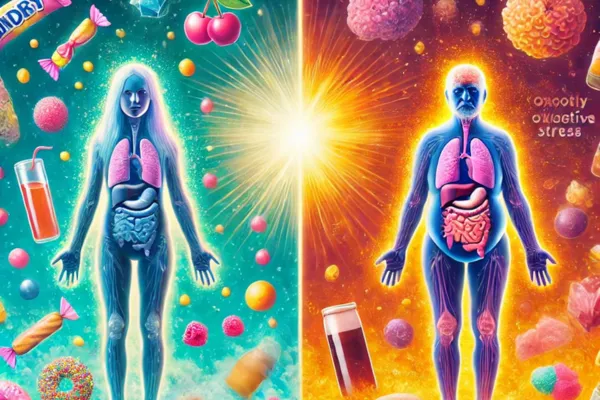2632 Tree Crown Schertz TX 78154
2632 Tree Crown
Schertz TX 78154
Blogs
Blogs

Why Sugar Hits Harder as We Age 🍬➡️🧓
As we age, many of us notice that our bodies don’t respond to food the same way they did when we were younger. 🍞🍔 Maybe you could eat bread, pasta, or sugary treats without gaining weight or feeling sluggish. Now, it’s different. Why is that?
Dr. Peter Attia and Rich Johnson explore this in their latest conversation, diving deep into the role of mitochondria—the tiny powerhouses in our cells—and how they change with age. Here’s the simple version:
👉 When we’re young, our mitochondria are like new batteries: They’re efficient at turning food into energy, helping us burn through sugars and stay active.
👉 As we age, these batteries wear down: Years of oxidative stress (damage from processing food, especially sugar) make them less effective. This means:
* Less energy for your body to function.
* More fat storage, even if you eat the same amount.
* Feeling tired or sluggish more often.
👉 What about menopause? For women, declining estrogen during menopause leads to higher uric acid levels, which can further disrupt energy production and fat metabolism. This explains why many women experience sudden weight gain or increased difficulty managing glucose around this time.
💡 The good news? Your mitochondria can be revitalized! Research shows that small changes, like reducing sugar and fructose intake, incorporating fasting, or even caloric restriction, can help restore mitochondrial health.
🚀 Want to dive deeper into this fascinating topic? Warning: it’s a bit science-heavy, but worth it! Check out the full conversation here:
Let’s focus on building habits that keep us energized, strong, and healthy at every stage of life. 🌟
Hi! We're A Local Gym In Schertz, TX
Established in 2022, it’s our mission to help people in Schertz, TX and surrounding areas get fit, stay healthy, and live life on their terms without fitness being an obstacle at Freedom Body Fitness Gym!
Schedule Your FREE In-Person Visit Today


Important Info
working hours
By Appointment Only.
Mon-Wed-Fri
5am- 10am
4pm- 7pm,
Tue - Thur
7AM- 10AM,
4PM- 7PM




